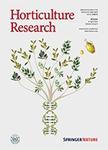Building a cluster of NLR genes conferring resistance to pests and pathogens: the story of the Vat gene cluster in cucurbits
作者机构:INRAEGAFL84143 MontfavetFrance INRAECNRGV31326 Castanet-TolosanFrance INRAEGDEC-Gentyane Plateform63000 Clermont-FerrandFrance Universite Paris-SaclayINRAEEPGV91000 Evry-CourcouronnesFrance
出 版 物:《Horticulture Research》 (园艺研究(英文))
年 卷 期:2021年第8卷第1期
页 面:899-910页
核心收录:
学科分类:09[农学] 0904[农学-植物保护] 090401[农学-植物病理学] 090402[农学-农业昆虫与害虫防治]
基 金:the French Ministere de l’agriculture et de l’alimentation(Vat&Co project-CASDAR−2017-2021)
主 题:NLR cluster resistance
摘 要:Most molecularly characterized plant resistance genes(R genes)belong to the nucleotide-binding-site-leucine-rich-repeat(NLR)receptor family and are prone to duplication and transposition with high sequence *** this family,the Vat gene in melon is one of the few R genes known for conferring resistance to insect,i.e.,Aphis gossypii,but it has been misassembled and/or mispredicted in the whole genomes of *** examined 14 genomic regions(about 400 kb)derived from long-read assemblies spanning Vat-related genes in Cucumis melo,Cucumis sativus,Citrullus lanatus,Benincasa hispida,Cucurbita argyrosperma,and Momordica *** built the phylogeny of those *** the paleohistory of the Vat gene cluster,we revealed a step by step process beginning from a common ancestry in cucurbits older than 50 *** highlighted Vat exclusively in the Cucumis genera,which diverged about 20 my *** then focused on melon,evaluating a minimum duplication rate of Vat in 80 wild and cultivated melon lines using generalist primers;our results suggested that duplication started before melon *** phylogeny of 44 Vat-CDS obtained from 21 melon lines revealed gain and loss of leucine-rich-repeat domains along ***,we revealed the high putative recognition scale offered in melon based on a combination of SNPs,number of leucine-rich-repeat domains within each homolog and number of homologs within each cluster that might jointly confer resistance to a large pest and pathogen *** on our findings,we propose possible avenues for breeding programs.



